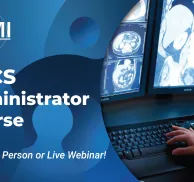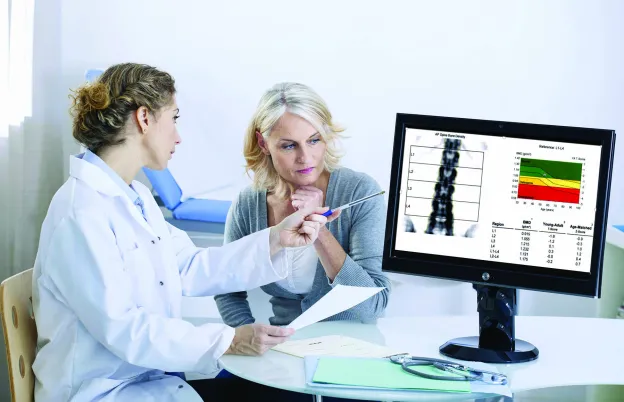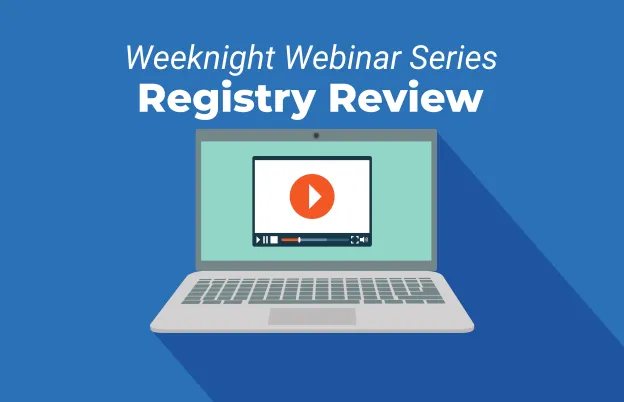
Pathways to Improving Your Mental and Emotional Wellness
About this Program
New Mental Health 4-Part Webinar Series for Imaging Professionals. Do you find yourself exhausted at the end of the day? The radiology work place can be stressful and challenging. Pathways to Improving Your Mental and Emotional Wellness addresses the need to have an emotionally and physically balanced work environment. It is a one-of-a-kind program that provides radiologic technologists the tools and strategies to lead a healthier and more productive work life.
Session 1: Microaggressions Demystified: Challenging Subtle Discrimination in Radiology
Microaggressions can have a big influence on people and the culture of the workplace. In this webinar, we'll examine the definition and several types of microaggressions that are frequently seen in the radiology industry. You will learn how to identify and comprehend the nuances of microaggressions through the examination of real-world circumstances. We'll look at the deep impact of microaggressions on people, such as the emotional and psychological toll they can have. You will learn actionable techniques for responding to microaggressions constructively and setting professional boundaries. The webinar will round off with a discussion on organization policies to address microaggressions and a brief overview of the DEI initiatives and its components.
Session 2: Thriving in Chaos: Finding Mental Well-Being in Healthcare
Chaos, stress and burnout are themes rampant in healthcare. Join us to discover the key to nurturing your mental well-being to survive in our industry. This session explores the significance of emotional and cognitive health for radiology professionals. We delve into neuroscientific and psychological concepts, uncovering the impact of emotions on mental well-being and the importance of cognitive health. Practical strategies to include self-compassion, active listening, and fostering positive relationships are emphasized as essential tools for well-being. Engaging in the state of flow and aligning with the soldier's mindset for mental preparedness offer unique perspectives for you. The goal is to leave this session feeling empowered to prioritize your mental well-being and apply the insights gained to flourish both personally and professionally. Join us for the subsequent webinars in our series to explore stress management, burnout, and microaggressions, gaining further tools to navigate successfully in your profession.
Session 3: From Stress to Success: Navigating High-Pressure Radiology Workplaces
Doing more with less in your workplace? Need the job, but not the stress? Then this session is for you! This session aims to equip you with essential strategies to address, recognize, and navigate stress in your demanding work environment. You'll begin by exploring the concept of stress, and emphasizing the impact on your professional performance. You will gain insights into the unique stressors faced by radiology professionals and how external factors exacerbate stress levels. This session focuses on practical strategies for managing stress, including a discussion on the myth or reality of work-life balance. Building resilience is an essential aspect covered in the webinar, with an emphasis on developing coping mechanisms, enhancing emotional intelligence, and fostering crucial conversations for effective communication and conflict resolution. You should walk away feeling less stressed and armed with strategies to get rid of negative stress and thrive on positive stressors!
Session 4: Beating Burnout: Practical Tools for Building Resilience in Radiology
This webinar provides useful tips for preventing burnout and fostering personal well-being. We will go into the definition and signs of burnout during the event, studying the elements unique to the radiology and healthcare sectors. Through self-assessment tasks, participants will improve their understanding of recognizing burnout triggers, both internal and external. The webinar focuses on self-care and resilience practices, highlighting the value of work-life balance, stress reduction methods, and encouraging emotional well-being. Participants will also learn how to improve workplace well-being through effective teamwork, communication, and support networks.
Educational Objectives
Session 1: Microaggressions Demystified: Challenging Subtle Discrimination in Radiology
At the conclusion of the course, the participants should be able to:
- Define "microaggression"
- Give an example of a microaggression in a radiology department
- Identify different forms of microaggression
- Discuss some of the psychological effects of microaggressions
- Discuss the negative effects microaggressions have on the workplace/environment
- Describe methods to promote a culture for awareness, inclusivity and empowerment
- Learn to respond to microaggressions in a constructive manner
- Discuss how to prepare your department with training, policies and procedures and reporting mechanisms specifically for microaggressions
Session 2: Thriving in Chaos: Finding Mental Well-Being in Healthcare
At the conclusion of the course, the participants should be able to:
- Explore the neuroscientific and psychological concepts related to mental well-being
- Understand the connection between emotions and cognitive processes
- Discuss strategies for enhancing cognitive abilities
- Define neuroplasticity
- Describe steps to create a culture of openness, empathy, and psychological safety
- Discuss mental preparedness techniques used by soldiers and how they might help you
Session 3: From Stress to Success: Navigating High-Pressure Radiology Workplaces
At the conclusion of the course, the participants should be able to:
- Discuss the causes of job specific stress in a radiology department
- Recognize the impact on job performance and job satisfaction
- List strategies for reframing stress and using it as a motivator for growth
- Discover cognitive-behavioral techniques to manage stress and negative thinking patterns
- Learn strategies to improve emotional intelligence
- Describe conflict resolution techniques
Session 4: Beating Burnout: Practical Tools for Building Resilience in Radiology
At the conclusion of the course, the participants should be able to:
- Define factors attributing to burnout
- Self-assess for burnout triggers
- Describe stress-management techniques
- Create a support network at work
- Improve communication with coworkers
- Develop strategies for self-care and support
- Understand the benefit of time management and time off
Schedule
In-person and live webinar options
Pathways to Improving Your Mental and Emotional Wellness
(All Sessions Run From 6pm to 8pm Central Time)
Session 1: Microaggressions Demystified: Challenging Subtle Discrimination in Radiology
Understanding Microaggressions (15 mins)
- Definition of microaggressions and their impact on individuals and the workplace
- Common types of microaggressions encountered in the radiology field
- Examples of microaggressions in radiology settings
- Open Discussion on the topic
Recognizing Microaggressions (15 mins)
- Identifying subtle forms of microaggressions in verbal and non-verbal communication
- Understanding the difference between intent and impact in microaggressions
- Scenarios to illustrate different types of microaggressions
Impact of Microaggressions on Individuals and the Workplace (15 mins)
- Psychological and emotional effects of microaggressions on targeted individuals
- The role of microaggressions in perpetuating bias and discrimination
- Negative impact on workplace morale, teamwork, and productivity
Break 5 mins
Strategies for Addressing Microaggressions (15 mins)
- Creating a culture of awareness and inclusivity
- Open dialogue and communication channels (15 mins)
- Educating colleagues about microaggressions and their impact
- Empowering individuals to respond to and address microaggressions
Responding to Microaggressions (15 mins)
- Techniques for responding to microaggressions in a constructive manner
- Setting boundaries and asserting oneself professionally
- Seeking support from mentors, supervisors, or HR when necessary
Implementing Organizational Strategies (15 mins)
- Developing policies and procedures to address microaggressions
- Training programs and workshops on diversity, inclusion, and unconscious bias
- Monitoring and reporting mechanisms for incidents of microaggressions
Q&A Session (10 mins)
- Answering questions from participants
- Addressing specific concerns or scenarios shared by attendees from the webinar
Recap of key takeaways and insights from the webinar
Session 2: Thriving in Chaos: Finding Mental Well-Being in Healthcare
Introduction (15 minutes)
- Setting the context for the importance of mental well-being in the radiology profession
Emotions and Mental Health (15 minutes)
- Exploring the role of emotions in mental well-being
- Understanding the connection between emotions and cognitive processes
- Strategies for cultivating emotional intelligence and managing emotions effectively
Cognitive Health and Mental Resilience (10 minutes)
Why Pay Attention to Mental Well-being (15 minutes)
- Defining mental well-being and its significance in personal and professional life
- Exploring the neuroscientific and psychological concepts related to mental well-being
- The direct and subtle impact of mental well-being on cognitive function and emotional
- resilience
- Acknowledging the Need for Help/Support
- The importance of cognitive health for overall well-being
- Strategies for enhancing cognitive abilities, such as memory, focus, and decision-making
- Concept of neuroplasticity and its implications for cognitive enhancement
Break: 10 mins
Self-Care, and Mental Well-being (15 minutes)
- The significance of self-care practices for mental well-being
- Techniques for stress reduction, relaxation, and rejuvenation
- What to do when everyone around seems fine?
- Impact of self-compassion on overall mental health
Promoting Mental Well-being in the Workplace (15 minutes)
- Creating a culture of openness, empathy, and psychological
Flow and Battle Preparedness (20 minutes)
- Flow and its relationship to mental well-being
- Extracting lessons from mental preparedness techniques used by soldiers
- Applying mental preparedness strategies to enhance resilience and well-being
Q&A Session (15minutes)
- Q and A
Providing personalized insights and practical solutions
Session 3: From Stress to Success: Navigating High-Pressure Radiology Workplaces
Introduction (15 minutes)
- Discussion of the prevalence of burnout and stress among radiology professionals
- Personal Stories
Understanding Stress and Burnout (15 minutes)
- Defining stress and burnout and their impact on individuals
- Exploring the causes and signs of stress in the radiology profession
- Recognizing the impact of stress on job performance and overall job satisfaction
Identifying Sources of Stress in Radiology (15 minutes)
- Common stressors specific to the radiology profession
- Self-assessment exercises to identify personal stress triggers and the intersection of
- professional stress
- Impact of external factors on stress levels especially when not addressed
- Differentiating Between Negative and Positive Stress
Break: 10 mins
Strategies To Manage Stress (20 minutes)
- Debunking the myth of work-life balance and exploring its practical implications
- Techniques for managing or resolving stress
- Cognitive-behavioral techniques to manage stress and negative thinking patterns
- FMLA or no? Should I stay or Should I Go?
- Strategies for reframing stress and utilizing it as a motivator for growth
Building Resilience (10 minutes)
- A Developing coping mechanisms and adaptive strategies
- Enhancing emotional intelligence and crucial conversations
- Should I say no?
Effective Communication and Conflict Resolution (15 minutes)
- Strategies for assertive communication in stressful situations
- Conflict resolution techniques to maintain healthy relationships
- Crucial Conversations for resolving conflicts and reducing stress Q&A Session (20 minutes)
Q and A
Providing personalized insights and practical solutions
Session 4: Beating Burnout: Practical Tools for Building Resilience in Radiology
Introduction (10 minutes)
- Welcome and introduction to the topic
- Context for burnout in radiology and healthcare industries today
- Small discussion on personal experiences
Understanding Burnout (10 minutes)
- Definition and symptoms of burnout
- Factors contributing to burnout in radiology and healthcare
- The impact of burnout on individuals and patient care
Identifying Burnout Triggers (15 minutes)
- Common stressors and challenges in the radiology profession
- Recognizing personal and environmental factors that contribute to burnout
- Self-assessment exercises to identify individual burnout triggers
I don’t suffer from Burnout Break : 10mins
Strategies for Self-Care and Resilience (15 minutes)
- Importance of self-care and its role in preventing burnout
- Techniques for managing stress and promoting work-life balance
- Building resilience through mindfulness, self-compassion, and emotional well- being
- Elements of a healthy professional: Incorporating exercise, nutrition, and sleep into a healthy
- lifestyle.
Enhancing Workplace Well-being (15 minutes)
- Creating a supportive and positive work environment
- Effective time management and prioritization strategies to include time off
- Improving communication and fostering teamwork
- Vulnerability-When and How
- What happens when you don’t get help from your seniors
Promoting Personal and Professional Growth (15 minutes)
- Setting realistic goals and expectations
- Developing a growth mindset and seeking continuous learning opportunities
- Finding meaning and purpose in the radiology profession
Building Resilience during Challenging Times ( 15 minutes)
- Strategies for coping with adversity and uncertainty-tensile strength
- Adapting to changes in the healthcare industry
- Developing strategies for self-care and support during crisis situations
Q&A Session (15 minutes)
- Questions and Answers
- Recap of key takeaways from the webinar
Audience
Who should attend?
Technologists aspiring to understand and improve their mental health, work-life balance and performance.
Program Faculty
Meet your presenter(s)

Nicole Dhanraj
PhD, RT(R)(CT)(MR)
Dr Nicole Dhanraj is an army veteran with a diverse background. She is an experienced Director of Radiology, Professor, Edupreneur, Author, International Speaker, Dissertation Mentor, Content Developer, and Appreciative Inquiry Facilitator. She has over 10 years of teaching face to face, online, and hybrid. Dr. Dhanraj received her bachelor’s degree in Psychology from St Martin’s University and her Master’s in International Relations, graduating magna cum laude from Troy State University. She earned her doctorate with an emphasis in Organizational Management from Capella University. She received her certification as an appreciative inquiry facilitator through Case Western Reserve University. She has several certifications to include project management, human resources, radiology administrator.
Credits
Accredited training programs

ASRT Category A
This program provides 2 hour(s) of Category A continuing education credit for radiologic technologists approved by ASRT and recognized by the ARRT and various licensure states. Category A credit is also recognized for CE credit in Canada. You must attend the entire program to receive your certificate of completion.
Tuition
Convenient payment options available
| Audience | Price | Early Price | Member Price | Member Early Price |
|---|---|---|---|---|
| Technologist | $49.75 | $47.25 | $44.75 | $42.50 |
~ Tuition amount listed is per session. ~
Early Pricing Guidelines
Qualifying 'Early' registrations must be made at least 4 days in advance for the program.
Cancellation Policy
Webinars less than 8 hours of credit
Refunds, minus a $15 processing fee, will be granted for cancellations received at least 3 days prior to the program. Cancellations received within 3 days of the webinar will receive a credit toward a future MTMI program, minus the $15 processing fee. No refunds will be made after the webinar starts. MTMI reserves the right to cancel any scheduled program because of low advance registration or other reasons. MTMI’s liability is limited to a refund of any program tuition paid. WEBINAR ATTENDEES that cannot log in due to unsolvable technical issues beyond their control will be eligible for a full refund.











